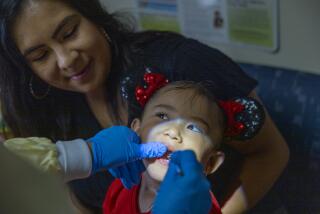Dentists Seek to Alleviate AIDS Fears : Personal health: Dental groups are urging patients to ask questions and learn more about office procedures to help ensure their safety.
- Share via
When the 32,000-member Academy of General Dentistry convenes its annual meeting in Orlando, Fla., this week, dentists will acknowledge the beginning of a new era. Some call it post-Bergalis.
Kimberly Bergalis is the Florida woman who is near death after being infected with the AIDS virus by her dentist, David J. Acer, in 1987. Acer died of the disease last year at age 40. Four other patients were found to be infected by the dentist--the first known transmission of the AIDS virus from a health-care worker to patients.
In the wake of these cases--two of which were reported only last month--the dental profession has rushed to convince the public that dental care is safe and that these were aberrations.
The academy will address ways to ease public concern at its meeting this week. Meanwhile, the American Dental Assn. calls its public relations strategy to relieve patient anxiety the “most important health education campaign in its 132-year history.”
If health professionals do not seize the opportunity to reassure anxious patients now, say spokesmen for both organizations, the public’s trust in the dental profession might be severely undermined.
“This issue is off the meter in terms of emotion,” said Christine Dumas, a USC professor of clinical dentistry who has been making the rounds of media organizations this month on behalf of the ADA.
“If the public is left in the dark, (hysteria) could be a problem. But hopefully, if we give people concrete information, they’ll know what to do.”
The question dental patients want answered: How do you know if you are safe from the risk of HIV exposure?
No federal law forbids HIV-infected health professionals from treating patients. The government has issued some safety guidelines that stop short of asking professionals to tell officials if they are HIV positive. (The guidelines do ask that HIV-infected dentists either refrain from performing invasive procedures, such as those causing bleeding, or disclose their HIV status to patients.)
Some critics of the federal policy have called for mandatory AIDS testing of all health professionals and the barring of HIV-infected practitioners from providing any services.
Organizations like the ADA and the academy urge patients to be more aggressive about learning what goes on in a dental or medical office and in asking questions about patient safety.
“In this day and age, people are going to have to take a more active role in health care,” says Dumas. “But a lot of people will take more time researching how to buy a TV set.”
Patients should look for several things that can indicate whether a dentist or hygienist is following recommended procedures to control the spread of infections like AIDS and hepatitis, Dumas says.
These ADA recommendations include:
* Do staff members wash their hands each time they enter the examination room?
* Is every staff member wearing gloves? Do they don new gloves each time they enter a room and discard their gloves when they leave the room?
* Do they wear protective eyewear and masks?
* Are you asked to complete an extensive medical history questionnaire during your first office visit? This questionnaire should seek information about any infectious illnesses you have had in the past.
* What kind of disinfectant and sterilization processes does the office use? How do they clean each room between patients? How do they dispose of needles and other infectious waste? Health officials stress that the AIDS virus is easily killed by proper sterilization and disinfecting procedures.
Patients should ask their dentist or hygienist how they ensure a sterile environment, experts say.
“It’s easy to bring it up because it’s in the news. You can say, ‘I read about this. I have a lot of faith in you, but what are you doing here for infection control?’ ” Dumas says. “It’s a patient’s right to know.”
Patients may not fully understand the procedures or know if they meet federal guidelines set by the Centers for Disease Control in Atlanta. The important thing, according to spokesmen for dental organizations, is whether the dentist or hygienist seems interested in reassuring you and confident of their procedures.
Consumers should ask themselves whether they feel comfortable with a dentist and the hygienists, Dumas says.
“You need to feel comfortable with the whole package,” she adds. “How much time do they spend talking to you? If you’re not getting answers to your questions or you don’t like the answers you’re getting, you can look for someone else.”
Long Beach dentist Richard Lewis, past president of the California Dental Assn., says his organization is urging members to welcome patient queries.
Three years ago, the CDA created a “dental patient bill of rights.” Lewis says he keeps a cardboard stand listing those rights on his front office counter.
“It publicizes to the dental consumer that they have rights. One is the right to expect the profession to use infection-control procedures,” he says.
Another right is asking questions.
“We tell patients, ‘Don’t hesitate. If you have a question about anything, please ask us,’ ” he says.
Patients interested in infection control are invited to see the sterilization equipment in his office.
Dr. Henry Finger, president of the Academy of General Dentistry, says dentists are most concerned about those patients who don’t ask questions or who refuse to call the office or visit because of a fear of AIDS transmission.
“My biggest concern is the few . . . patients who don’t seek dental care because of the fear and don’t have the opportunity to learn about infection control,” he says.
Concerned patients can take other steps. They can call the state Department of Health Services to ask about complaints lodged against a dentist. Sometimes, reports of inadequate infection control are reported, although dental offices are not routinely examined for infection control.
Some patients may want to ask their dentists if he or she is HIV-positive.
A recent Newsweek poll found that 65% of the respondents would discontinue all treatment with that person if they knew a physician, dentist or other health-care worker treating them was infected with the AIDS virus. Fifteen percent said they would continue treatment with stringent protective measures, and 13% would continue treatment but exclude surgery or other invasive procedures.
“If it’s a concern, I think you should ask,” Dumas says.
And, says Finger: “I don’t think it’s a rude question. I believe the majority of dentists would answer that question.”
According to the ADA, about 156 U.S. dentists have AIDS, and about 1,248 dental workers are HIV-positive.
But discovering your dentist is not HIV-positive does not guarantee safety, experts note.
Proper infection control should limit the spread of disease from doctor to patient, patient to doctor and patient to patient, Dumas says. In HIV testing of 6,000 dentists, two were found to have been infected by patients, the ADA has reported.
“The danger is from the patient who was in the office an hour ago,” Lewis says. “The only real protection the patients have is if the office uses infection control.”
Federal health officials are unsure how Acer transmitted HIV to five of his patients, but unsterile conditions are likely to be at the root of the perplexing case.
According to a recent federal report, Acer was a bisexual who treated about 10 patients with AIDS. He also may have treated IV drug users. Investigators have found that he did not practice stringent infection-control procedures. He is said to have reused some disposable equipment and not to have used gloves on some occasions.
There is no way to know how many dentists adhere to the ADA guidelines on infection control, Dumas says. But at a February, 1991, federal hearing on HIV transmission, Indiana dentist Trusten Lee testified that he believes only 10% to 15% of dentists routinely disinfect drills and drill tips between patients. Other experts mentioned the high cost of sterilization and disposable materials, which may add to some dentists’ reluctance to follow guidelines. The extra costs from infection-control procedures are not usually reimbursed by insurance.
Dr. James Curran, director of the Centers for Disease Control’s AIDS Division admitted that “there is room for improvement” in infection control.
But, says Finger, a survey conducted every two years of Academy of General Dentistry members shows that 98% utilize effective infection-control techniques.
New professional guidelines to minimize the spread of infection could evolve, Dumas notes.
For example, to help dentists and patients better assess the risk of infection, an ADA committee is compiling a list of invasive procedures, assigning each a risk status. And dentists will continue to look for new ways to protect--and reassure--patients.
More to Read
Sign up for Essential California
The most important California stories and recommendations in your inbox every morning.
You may occasionally receive promotional content from the Los Angeles Times.










